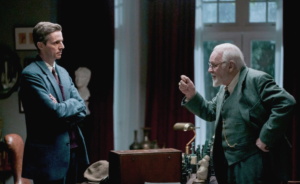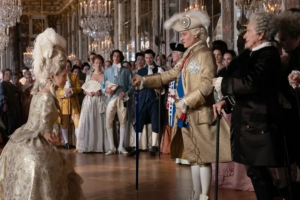Saltburn Reviewed by GREG KING
Director: Emerald Fennell
Stars: Barry Keoghan, Jacob Elordi, Archie Madekwe, Richard E Grant, Rosamund Pike, Alison Oliver, Paul Rhys, Will Gibson, Carey Mulligan

The sophomore feature from writer/director Emerald Fennell, who won an Oscar for her screenplay for 2020’s Promising Young Woman, Saltburn is a dark comedy thriller about obsession, excess, gender, sex, power, privilege, and a desperate desire to belong. It’s a debauched variation of The Talented Mr Ripley meets Brideshead Revisited.
It is 2006. Oliver Quick (Barry Keoghan, from The Banshees Of Inisherin, etc) is a lonely, introverted working class student who has arrived at Oxford on a scholarship for his first year in the venerable institution. However, he seems a very private person and his background seems a little dubious. He does a favour for the handsome, wealthy and outgoing Felix Catton (Australian actor Jacob Elordi, from tv series Euphoria, etc), who is confident and whose personality is the opposite of Oliver’s. But his kind act is later repaid when Felix takes pity on Oliver, takes him under his wing and introduces him to the cool crowd. And then after a family tragedy befalls Oliver, Felix takes pity on him and invites him to spend the summer holidays with his family at their sprawling 12th century estate at Saltburn.
Oliver begins to ingratiate himself into the lives of the wealthy and entitled aristocratic family. The family includes father Sir James (Richard E Grant), acid tongued mother Elspeth (Rosamund Pike), and promiscuous and depressed chain-smoking sister Venetia (Alison Oliver). The family warmly welcome Oliver and embrace him, not fully realising the threat that he poses. They even organise a Midsummer’s Night Dream-themed Bacchanalian party to celebrate his birthday. However, Felix’s watchful American cousin Farleigh (Archie Madekwe, from Gran Turismo, etc) resents Oliver’s presence and this sets up some tension between the pair.
However, Oliver’s downtrodden demeanour hides a sociopathic personality and as his carefully constructed lies and façade are exposed he becomes more dangerous to the family. The hedonistic summer of fun takes on a darker turn, and Fennell’s tale grows darker as it develops. Saltburn takes a couple of unexpected turns that subvert the audience’s expectations.
Fennell gives the relationship between Oliver and Felix a strong homo-erotic nature, and the film constantly subverts our expectations. Fennel shot the film in the boxy Academy ratio, and it is laden with sinister undertones and a gradual air of foreboding permeates the material. But beneath the surface there is also a satire of the decadence of the upper class. The drama unfolds to a contemporary soundtrack that includes The Killers, Arcade Fire and Sophie Bextor-Ellis.
Keoghan has a chameleon-like ability to inhabit the often creepy and unlikeable characters he plays on screen, and here he uses his slightly shifty features, hunched over posture and unsettling facial expressions to good effect. This is, arguably, his best performance to date. And the final scene in which eh dances naked through the halls of Saltburn is not easily forgotten. Elordi, who will next be seen as Elvis in the upcoming biopic Priscilla, brings a casual seductive charm to his performance but his character remains largely underdeveloped. Grant and Pike bring some humour to the material as Felix’s clueless parents. Paul Rhys brings a slightly unnerving air to his role as Duncan, the family’s ever present and vaguely menacing butler.
Saltbush is a much more ambitious film than Fennell’s debut, and it shows that she has developed more confidence as a filmmaker. Production values are superb and this is a lavish production featuring sumptuous visuals, courtesy of cinematographer Linus Sandgren (Babylon, etc), who bathes the film in an over saturated golden palette, while Suzie Davis’s gorgeous production design for the sprawling family home allows audiences to immerse themselves in this environment of wealth and privilege.
★★★☆



